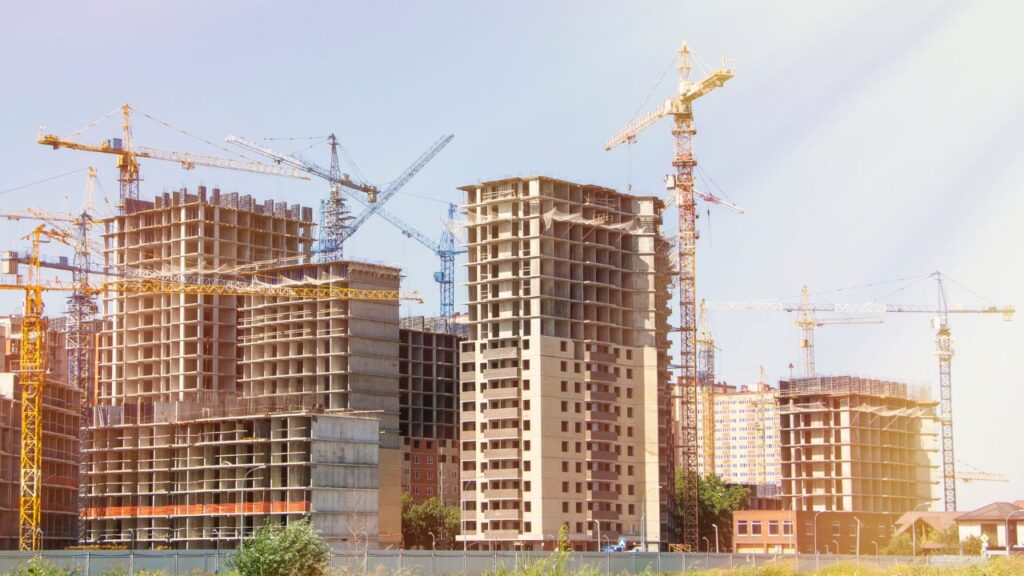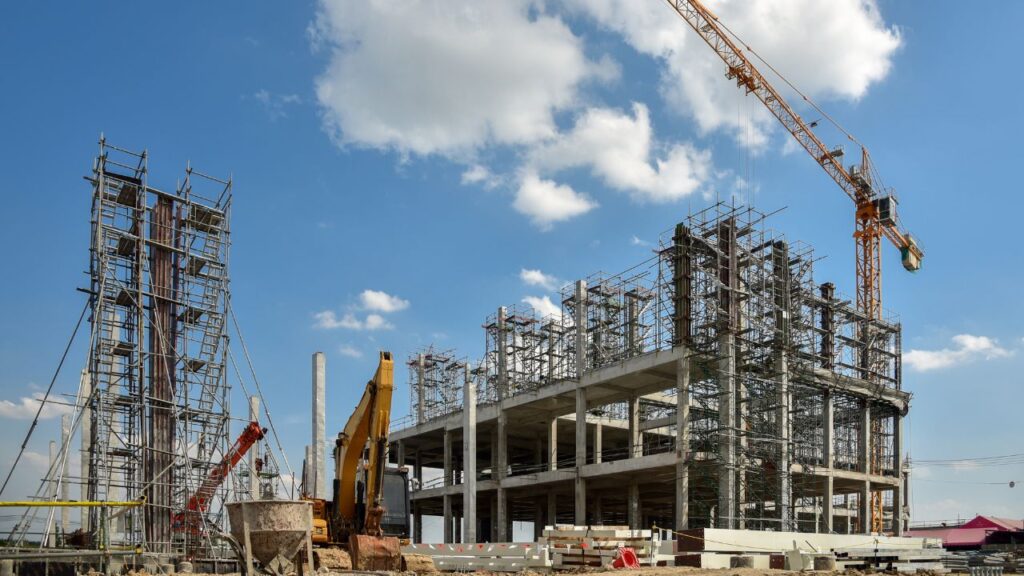A Wining Cost Estimate
That Helps You To Win More Construction Projects

Commercial construction projects require careful planning and budgeting to ensure their success. One crucial aspect of this process is preparing accurate estimates for the project costs. In this article, we will delve into the world of commercial construction estimates, examining their key components, factors affecting them, and the methods used to create them. By the end, you’ll gain a comprehensive understanding of how commercial construction estimates are prepared and utilized in the industry.
Commercial construction estimates are detailed assessments of the costs involved in a construction project. These estimates are essential for various stakeholders, including contractors, project managers, and clients, as they provide a financial roadmap for the project. A well-prepared estimate helps in securing financing, making informed decisions, and ensuring the project’s profitability.

Commercial construction estimates are comprehensive evaluations of the expenses associated with a construction project. They encompass various elements such as materials, labor, equipment, permits, overhead costs, and profit margins. These estimates serve as a guide to determine the overall budget for the project and help stakeholders allocate resources effectively.

Accurate estimates are crucial for successful commercial construction projects. They provide a clear understanding of the financial requirements and help avoid cost overruns and delays. Here are some key reasons why commercial construction estimates are important:
Financial Planning: Estimates allow project stakeholders to determine the financial feasibility of a construction project and make informed decisions about its execution.
Budget Control: Estimates help establish a realistic budget for the project, allowing for effective cost control and preventing financial surprises.
Bidding and Contracting: Estimates enable contractors to submit competitive bids and negotiate contracts based on the estimated costs.
Risk Assessment: Estimates help identify potential financial risks and uncertainties associated with the project, enabling proactive risk management.
Commercial construction estimates comprise several key components that contribute to the overall cost assessment. Understanding these components is crucial for accurate and detailed estimates. Let’s explore them:
The cost of materials constitutes a significant portion of any construction project. It includes the prices of various building materials such as concrete, steel, lumber, fixtures, and finishes. Estimators consider the quantity, quality, and market prices of these materials to calculate the material costs accurately.
Labor costs involve the wages of construction workers, supervisors, and subcontractors involved in the project. Estimators consider the labor hours required for different tasks, regional labor rates, and productivity levels to estimate labor costs effectively.
The complexity of a commercial construction project significantly impacts the estimate. Complex projects involving intricate designs, specialized equipment, and unique construction methods tend to have higher costs. Estimators carefully evaluate project plans and specifications to account for the complexity and associated expenses.
Overhead costs encompass indirect expenses not directly tied to materials or labor. They include administrative costs, insurance, permits, equipment rentals, utilities, and office expenses. These costs are typically calculated as a percentage of the direct costs to account for the project's overall overhead.
Several factors influence the accuracy and variability of commercial construction estimates. Estimators must consider these factors to ensure the estimates align with the project’s specific conditions. Let’s explore some of the key factors:
The geographic location of the construction project plays a significant role in estimating costs. Construction costs can vary based on regional labor rates, material availability, transportation costs, and local building regulations. Estimators need to account for these location-specific factors to provide accurate estimates.
Seasonal variations can impact construction costs due to weather conditions and resource availability. Certain construction activities may be more challenging or costly during specific seasons. Estimators must consider these seasonal fluctuations and adjust their estimates accordingly.

Fluctuations in the construction market can affect material prices, labor rates, and subcontractor availability. Estimators need to stay updated with market trends and adjust their estimates based on current market conditions to ensure accuracy.
Maximize your construction business’s potential with our competitive financing options

Commercial construction estimates are prepared using various methods and techniques. Estimators choose the most appropriate method based on project requirements, available data, and their expertise. Let’s explore some common estimation methods:
Quantity takeoff involves calculating the quantities of materials needed for the project based on the construction plans and specifications. Estimators use measurements and formulas to determine the quantities and then multiply them by the material prices to estimate the costs accurately.
Unit cost estimating involves determining the costs per unit of specific construction elements. Estimators use historical data or industry standards to assign unit costs to items such as square footage, linear feet, or individual components. Multiplying the unit costs by the quantities yields the estimated costs.
Parametric estimating relies on mathematical models and historical data to estimate costs based on project parameters. Estimators use statistical relationships between project characteristics (e.g., square footage, number of rooms) and historical cost data to create estimates.
Vendor quotes involve obtaining quotes from suppliers and subcontractors for specific materials, equipment, or services required for the project. Estimators collect multiple quotes and analyze them to determine the most cost-effective options for the estimate.
Preparing accurate commercial construction estimates can be challenging due to various factors. Estimators must navigate through potential hurdles to provide reliable estimates. Here are some common challenges:
Unclear or incomplete construction drawings can lead to misunderstandings and errors during the estimation process. Estimators rely on accurate drawings and specifications to assess the project accurately. In such cases, estimators need to seek clarifications from the project team to ensure accurate estimates.
Changes in project scope can significantly impact the estimated costs. As the project progresses, stakeholders may request modifications or additional features, leading to cost adjustments. Estimators must carefully track and evaluate scope changes to update the estimates accordingly.
Unforeseen site conditions, such as encountering rock formations or contaminated soil, can impact construction costs. Estimators must account for potential site-related challenges and incorporate contingency allowances in the estimates to handle unforeseen expenses.
Fluctuations in material prices, labor rates, or currency exchange rates can affect the accuracy of estimates. Estimators need to stay updated with market trends and factor in potential cost fluctuations to ensure the estimates remain reliable.
To ensure accuracy and reliability in commercial construction estimates, estimators follow industry best practices. Implementing these practices improves the quality of estimates and minimizes the risk of cost overruns. Here are some best practices:
Estimators conduct a comprehensive analysis of the project plans, specifications, and requirements. They carefully review the drawings, identify potential challenges, and analyze all relevant project details to create accurate estimates.
Accurate quantity takeoff is crucial for precise estimates. Estimators meticulously measure and quantify all required materials, ensuring that no essential components are overlooked. They use advanced software tools and take advantage of their experience and expertise in this process.

Analyzing historical cost data from similar projects helps estimators establish reliable benchmarks. They can identify patterns, trends, and cost drivers from past projects to inform their current estimates. Historical data analysis provides valuable insights into the expected costs and helps in making informed decisions.
Estimates should be regularly reviewed and updated as the project progresses and new information becomes available. Estimators collaborate with the project team to incorporate any changes, modifications, or scope adjustments into the estimates. Regular reviews help ensure the estimates remain accurate and aligned with the project's evolving requirements.

Technology plays a crucial role in enhancing the accuracy and efficiency of commercial construction estimates. Estimators can leverage various tools and technologies to streamline the estimation process and improve overall project outcomes. Let’s explore some important technological advancements:
Estimating software simplifies the estimation process by providing comprehensive tools and features. These software solutions automate quantity takeoff, enable data integration, perform calculations, and generate detailed reports. Estimators can save time, reduce errors, and improve collaboration by using specialized estimating software.
Building Information Modeling (BIM) is a digital representation of the project that includes 3D models, data, and information about the building components. Estimators can extract valuable data from the BIM model to enhance accuracy in quantity takeoff, visualize the project, and identify potential conflicts or issues.
Drones and 3D scanning technologies provide precise measurements, aerial imagery, and 3D models of the construction site. Estimators can utilize these technologies to capture accurate site data, assess topography, and incorporate the information into the estimates. Drones and 3D scanning save time, reduce errors, and improve overall project understanding.
To illustrate the practical application of commercial construction estimates, let’s consider a case study. The XYZ Corporation recently undertook a large-scale commercial construction project. Through careful planning, accurate estimation, and diligent cost control, the project was completed within the estimated budget and timeline.
The estimation team employed a thorough project analysis, leveraging historical data, and implementing advanced estimating software. They conducted a detailed quantity takeoff, considered various cost components, and accounted for project complexity and site-specific conditions. The team regularly reviewed and updated the estimates, ensuring alignment with any scope changes or market fluctuations.
The successful estimate for the XYZ Corporation project showcases the importance of meticulous planning, accurate estimation, and effective project management in commercial construction.
Commercial construction estimates are vital tools in the construction industry, providing a comprehensive assessment of project costs. By understanding the key components, factors, and methods involved in commercial construction estimates, stakeholders can make informed decisions, control budgets, and mitigate risks. Embracing technology and following best practices enhances the accuracy and efficiency of the estimation process. Accurate estimates contribute to the overall success of commercial construction projects.
Preparing a commercial construction estimate can vary depending on the project’s complexity and the available data. It may take a few days to several weeks to complete a detailed estimate.
Yes, commercial construction estimates can change during the project. Scope changes, unforeseen circumstances, or market fluctuations may require adjustments to the estimates.
Commercial construction estimates strive to be as accurate as possible, but there are inherent uncertainties in the construction industry. Estimators rely on their expertise, historical data, and thorough analysis to provide reliable estimates.
Contractors play a vital role in estimate preparation. They provide input on project requirements, construction methods, subcontractor costs, and other critical aspects that impact the estimates’ accuracy.
To ensure the accuracy of a commercial construction estimate, it is crucial to engage experienced estimators, conduct thorough project analysis, utilize advanced technology, review and update the estimates regularly, and seek input from the project team and industry experts.
Here I am going to share some steps to get your construction cost estimate report.
You can send us your plan on info@estimatorflorida.com
Before starting your project, we send you a quote for your service. That quote will have detailed information about your project. Here you will get information about the size, difficulty, complexity and bid date when determining pricing.
We do construction cost estimating and prepare a detailed report for your project. At last you finalize the report and finish the project.
561-530-2845
info@estimatorflorida.com
Address
5245 Wiles Rd Apt 3-102 St. Pete Beach, FL 33073 United States
561-530-2845
info@estimatorflorida.com
Address
5245 Wiles Rd Apt 3-102 St. Pete Beach, FL 33073 United States
All copyright © Reserved | Designed By V Marketing Media | Disclaimer
IMPORTANT: Make sure the email and cell phone number you enter are correct. We will email and text you a link to get started.
By clicking “I Agree” above you give Estimate Florida Consultin express written consent to deliver or cause to be delivered calls and messages to you by email, telephone, pre-recorded message, autodialer, and text. Message and data rates may apply. You are able to opt-out at any time. You can text STOP to cancel future text messages.